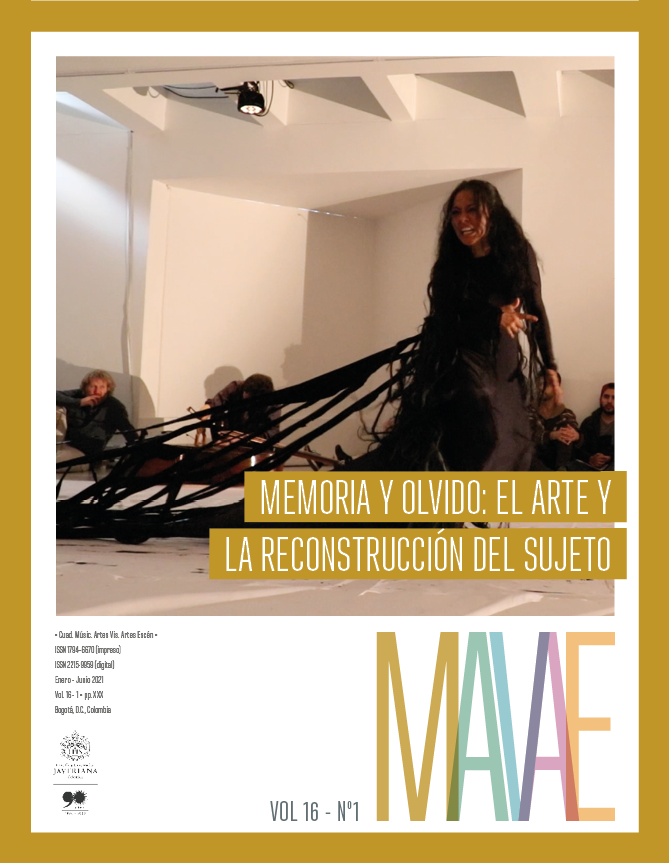Memories of a Dream: Visual Autobiography of a Recent Past in Colombia
##plugins.themes.bootstrap3.article.details##
This research in arts is assumed as part of a process of cultural transformation, because it relates the I with the we in the field of living and visual arts to expand the view on the different visions of war, violence and armed conflict in the Colombian collective imagination. The main objective is to create a poetic-political device that contributes to current critical actions and works with the notion of forced disappearance in the Colombian armed conflict in the 1980s. In this device, the life story of a former activist of the M-19 t in Colombia, institutional documents, and family testimonies are collected through narrative interviews, approached from the genre of autobiography within a creative process typical of contemporary artistic production. This staging relates three acts of a political subject in conflict: the act of memory, the political act itself, and the artistic act. In addition to the exhibition of two vectors of invisibility and forced disappearance, framed in the social reality of violence in Colombia in the context of the family and the armed guerrillas. The expected results are a return to the testimony of a family event to trace the memory from a flexible territory that leads to a displacement in the historical and artistic discourse on violence in Colombia.
prática artística, espaço familiar, desaparecimento, memória, cenografia, autobiografiamemoria, escenografía, autobiografía, práctica artística, espacio familiar, desapariciónmemory, scenography, autobiography, artistic practice, family space, disappearance
Arfuch, Leonor. 2013. Memoria y autobiografía: Exploraciones en los límites. Buenos Aires: Fondo de Cultura Económica.
Bachelard, Gaston. 2000. La poética del espacio. Buenos Aires: Fondo de Cultura Económica.
Breyer, Gastón. 2005. Escena presente: Teoría y metodología del diseño escenográfico. Buenos Aires: Infinito.
Constitución Política de Colombia. 1886. Colombia. Consultado: 3 de noviembre de 2020. http://www.suin-uriscol.gov.co/viewDocument.asp?id=1826862
De Blas, Felisa. 2006. “Espacio y teatro”. Acotaciones 16: 1-28. Consultado: 3 de noviembre de 2020. https://www.resad.es/acotaciones/acotaciones16/16felisa.pdf
Grabe, Vera. 2010. “M-19: De la lucha armada a la renuncia a la violencia”. En IV Jornadas internacionales sobre terrorismo los finales del terrorismo: lecciones desde la perspectiva comparada, 1-33. Fundación Manuel Giménez Abad de Estudios Parlamentarios y delEstado Autonómico. Consultado: 3 de noviembre de 2020. https://dialnet.unirioja.es/servlet/libro?codigo=662715
Méndez de Vigo y Montojo, Íñigo. 2017. “La paradoja teatral de Kentridge”. En William Kentridge: Basta y sobra, 2-3. Madrid: Museo Nacional Centro de Arte Reina Sofía. Consultado: 3 de noviembre de 2020. https://www.museoreinasofia.es/publicaciones/william-kentridge-basta-sobra.
Muñoz Fernández, Horacio. 2017. Posnarrativo: El cine más allá de la narración. Santander: Shangrila.
Ospina, William. 2019. “Estamos cansados”. El Espectador, 1 de diciembre de 2019. Consultado: 10 de marzo de 2020. https://www.elespectador. com/opinion/estamos-cansados-columna-893621/.Racière, Jaques. 2005. Sobre políticas estéticas. Barcelona: Museu d’ArtContemporani de Barcelona.
Salvi, Valentina. 2018. “Desaparición forzada”. En Diccionario de la memoria colectiva, dirigido por Ricard Vinyes. Barcelona: Gedisa.
Sánchez Gómez, Gonzalo. 2014. “Presentación”. En Normas y dimensiones de la desaparición forzada en Colombia, 17-18. Bogotá: Centro Nacional de Memoria Histórica. Consultado: 10 de marzo de 2020. http://www.centrodememoriahistorica.gov.co/micrositios/desaparicionForzada/libros-tomo1.html
Wajcman, Judy. 2017. Esclavos del tiempo: Vidas aceleradas en la era del capitalismo digital. Barcelona: Paidós.

This work is licensed under a Creative Commons Attribution 4.0 International License.


